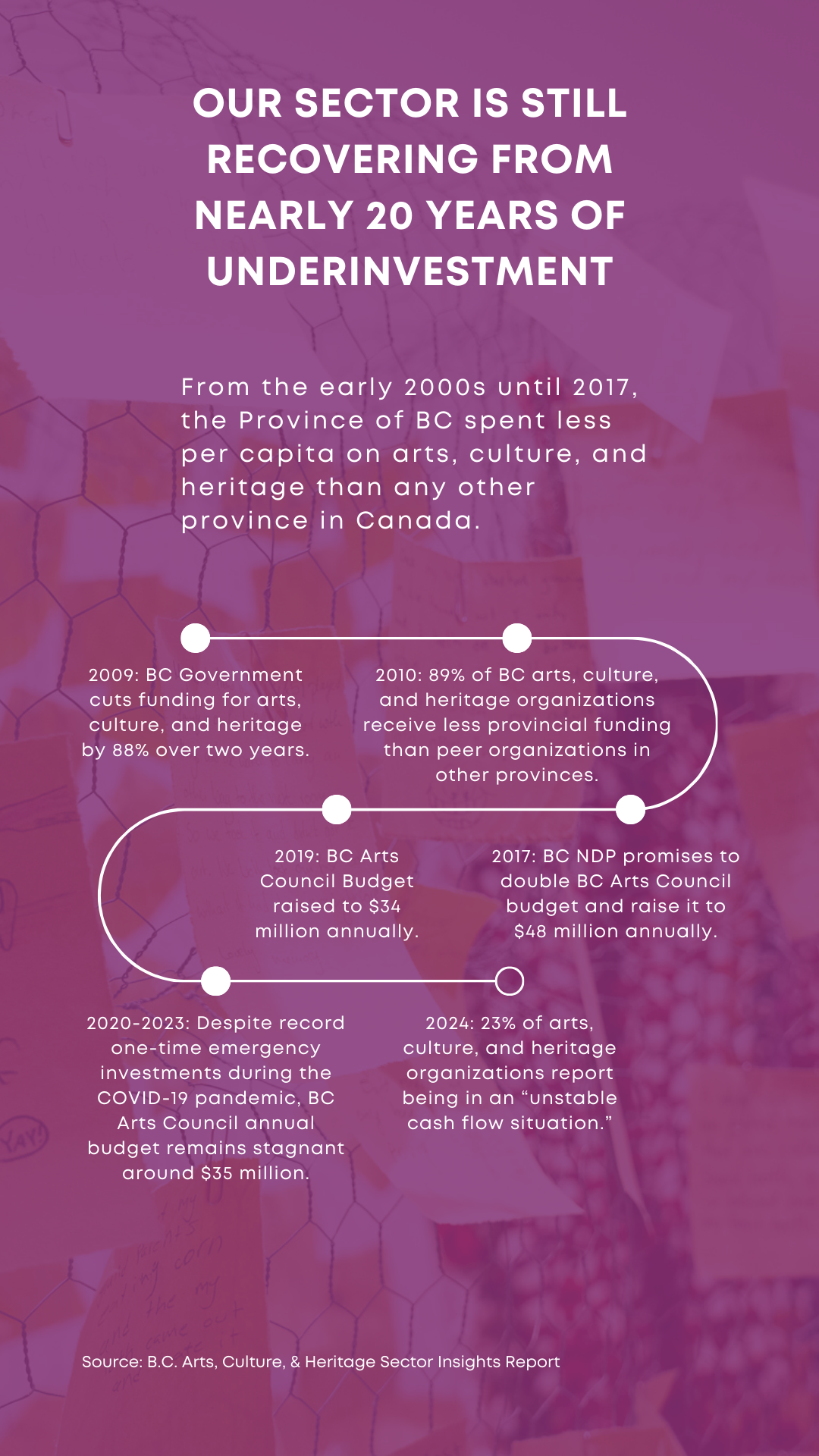Key Takeaways from Budget 2024
For Arts, Culture, and Heritage Organizations
On the whole, Budget 2024 is another status quo year for BC’s arts, culture, and heritage sector. And while the status quo for our sector is largely unsustainable, in the face of a global shift towards government austerity, the news contained in the new budget and accompanying service plans – while often disappointing – are also not entirely bad. The BC Museums Association has reviewed the Budget 2024 announcements and has compiled a list of key takeaways for our members. We hope to publish a follow-up after we have had more time to review the budget documents, service plans, and to connect with our arts, culture, and heritage partners.
When compared to our assessment of the 2023 budget, few, if any, of the challenges facing our sector are addressed in Budget 2024. Last year the BCMA wrote:
“We commend the Government of BC for its stated commitment in these documents to supporting reconciliation and greater equity in arts, culture, and heritage. However, we know that words in themselves are not enough. The chronic under-resourcing of our sector only serves to reinforce inequities and is an impediment to real and lasting systems change. We urge the Province to demonstrate this commitment by providing sufficient funding and support to make these ideals a reality.”
For the most part, our 2023 assessment still holds true in 2024.
Historical Context
While British Columbia’s arts, culture, and heritage sector is a national growth leader (the average province in Canada saw its arts, culture, and heritage GDP shrink by 12% while BC’s cultural economy broke the trends and grew by 7%), our sector is still working in a context of chronic underinvestment and scarcity.
In the late 2000s, the Government of BC cut existing arts, culture, and heritage funding by 88% over two years and by 2010, 89% of all arts, culture, and heritage organizations in BC received less provincial funding than peer organizations in other provinces. Government funding began to improve in 2017 when the BC NDP promised to double the BC Arts Council’s budget, raising it to $48 million annually (accounting for inflation, this promise would be $58.67 million in 2024). Today, the promised doubling of the BC Arts Council budget has still not been achieved with the budget remaining stagnant at around $35 million annually.
While BC is no longer the lowest funder of arts, culture, and heritage in Canada, the legacy of underinvestment during the 2000s and 2010s is still being felt today, creating nearly two decades of deferred maintenance and eroding the overall resilience of our sector.

To download this graphic, please visit the BC Coalition of Arts, Culture, and Heritage website: www.coalitionbc.ca/

Where to learn more about Budget 2024
5 Takeaways from the 2024 BC Budget and Fiscal Plan
1 Small Presence, Small Investments
The arts, culture, and heritage sector has very little presence within the budget and fiscal plan. The Province of BC frames the goals for the new budget as putting people first and building a strong economy. Despite BC’s arts, culture, and heritage sector being a national leader in creating new culture sector jobs, growing 26% faster than the national average, this new economy-focused budget and fiscal plan barely references the sector.
Keyword searches within the budget for words related to our sector produce the following results:
- Heritage = 0 mentions
- Museum = 3 mentions (all relating to the Royal BC Museum)
- Arts = 3 mentions (all relating to the Ministry of Tourism, Arts, Culture, and Sport)
- Culture = 3 mentions (relating to the Ministry of Tourism, Arts, Culture, and Sport)
- Tourism = 7 mentions
By contrast, the term “housing” is mentioned 154 times, “health” is mentioned 177 times, and “forest/forestry” is mentioned 31 times.
In most instances, funding for arts, culture, and heritage is maintained at status quo levels, but there are a handful of small new investments. The Ministry of Tourism, Arts, Culture, and Sport’s overall budget is increasing from $182 million in 2023/24 to $187 million in 2024/25. The service plan for the Ministry of Tourism, Arts, Culture, and Sport forecasts increased capital investment in the Royal BC Museum in the coming year, raising the capital budget by 65%.
2 The Province has still not doubled the BC Arts Council’s budget
In 2017, the BC NDP promised to double the BC Arts Council’s budget, raising it to $48 million annually (accounting for inflation, this promise would be $58.67 million in 2024). The BC Liberals had frozen the BC Arts Council’s budget at $24 million annually since the 2013/14 fiscal year. It received a $7.2-million boost to $31.2 million in 2017.
The 2024/25 budget proposes to raise the BC Arts Council budget from $38.56 million in the previous year to $38.97 million. While the new budget represents a slight increase, the loss of many pandemic-era one-time funding programs is projected to result in an overall reduction in grants awarded by the BC Arts Council. The service plan for the Ministry of Tourism, Arts, Culture, and Sport notes the number of projected grants administered by the BC Arts Council “reflects a return to normal base budget figures after 2022/23 figures showed a 27 per cent increase in grants due to Government’s additional investment of $34.5 million in one-time year-end funding to support the arts and culture sector as it worked towards recovery and renewal.”
3 COVID-Era Funds Ended
Budget 2024 is poised to be the first provincial budget in four years that has not included significant pandemic-era recovery or resilience funding for the arts, culture, and heritage sector. The service plan for the Ministry of Tourism, Arts, Culture, and Sport notes that pandemic “recovery has been uneven and systemic issues and challenges, particularly for live performances, are still in need of support for further recovery and growth” and that “resilience continues to be challenged by labour market shortages, fewer volunteers, affordability, and operating and capital inflationary pressures.”
The Ministry’s service plan also notes that unlike the creative industries sector which “has more than fully recovered from the impacts of the pandemic” or the sports sector that “is returning to pre-pandemic levels,” the recovery of the arts and culture sector has been uneven. As recent closures show, arts, culture, and heritage organizations have still not recovered from the pandemic and it is critical that all levels of government support our sector until we stabilize from the disruptions of the past four years. Without COVID-era funds, 2024/25 will almost certainly represent an overall reduction in funding for our sector.
4 Climate Change, Inflation, and Labour Shortages
Across the budget, financial plans, and service documents, climate change, inflation, and labour shortages are repeatedly noted as factors that are impacting the resilience of nearly every factor of our economy. The service plan for the Ministry of Tourism, Arts, Culture, and Sport writes:
“Live music companies continue to face significant increases in operating costs and issues caused by natural disasters, such as forest fires. Publishing companies continue to struggle with increased printing, paper, and shipping expenses. Monetization of music and publishing products remains difficult in a competitive and crowded digital environment. Additionally, the visual effects sector is challenged by labour shortages, with B.C. at risk of companies and workers relocating to other Canadian jurisdictions with a lower cost of living and better access to housing.”
While the risks that wildfires pose to communities are noted throughout the Ministry’s service plan, this risk is disappointingly not mentioned in the document’s section on heritage. As we have seen in the tragic destruction of two museums in the Village of Lytton, forest fires and climate change in general are an existential threat to our irreplaceable shared heritage. If the Province of BC is serious in its statement that “the preservation of heritage contributes to the vibrancy of B.C.’s communities and is an opportunity to build the diversity of the province’s cultural fabric for generations to come,” British Columbia needs to invest in developing an emergency response and recovery plan for museums and heritage spaces.
5 Encouraging Promise for Repatriation Policies and Initiatives
The service plan for First Peoples’ Cultural Council and the Royal BC Museum contain encouraging promises to support the repatriation of Indigenous cultural belongings and ancestral remains.
Highlights from the FPCC service plan include:
- Launch pilot projects to support First Nations in BC to undertake repatriation research, policy, and protocol development
- To assist communities with heritage stewardship and repatriation, FPCC will also develop new learning resources, including a resource featuring Indigenous repatriation experts speaking to their knowledge and experience in undertaking various repatriation projects throughout BC
- The scoping of a repatriation database that will identify museums which hold First Nations cultural belongings and ancestors, providing a starting point for communities engaging in repatriation efforts
- Develop research and policy papers to support First Nations rights related to repatriation and ownership of cultural belongings and ancestral remains
The BCMA supports these initiatives and will advocate with both the provincial and federal governments that the necessary funding and policies are in place to support Indigenous communities and organizations like First Peoples’ Cultural Council to take on this critical work.
Highlights from the Royal BC Museum service plan include:
- Continue repatriation of Indigenous Peoples’ belongings with an open, collaborative and community-led approach
- Work with the Province and partners including the First Peoples’ Cultural Council, the BC Museums Association, the Museum-appointed Indigenous Advisory and Advocacy Committee, respective First Nations, and others to develop a strategy to prioritize the repatriation of ancestral remains
- Support the Province in the development of a provincial repatriation policy framework under the Declaration Act Action Plan
- The service plan forecasts increases in the number of annual repatriation visits to the Royal BC Museum year over year
How You Can Help
The BCMA is a proud partner of the newly launched BC Coalition of Arts, Culture, and Heritage. The Coalition collectively represents thousands of arts, culture, and heritage organizations in every region and more than 188 communities in BC. This includes hundreds of cultural businesses, venues, festivals, consultants, and independent practitioners, as well as tens of thousands of professional artists, cultural practitioners, and volunteers throughout BC.
On the Coalition’s website you can find and download social media graphics, impact stats for our sector, and an annual advocacy calendar. You can also sign on to show your support for the Coalition’s three key strategic requests from the Province of BC.
We encourage you to visit the BCMA’s Advocacy Toolkit to download advocacy letters, learn more about speaking with elected representatives, and strategies to make our collective voice heard.
BC Coalition of Arts, Culture, and Heritage
We are the BC Coalition of Arts, Culture, and Heritage. Collectively our 29 organizations represent thousands of arts, culture, and heritage organizations in every region and more than 188 communities in BC. This includes hundreds of cultural businesses, venues, festivals, consultants, and independent practitioners, as well as tens of thousands of professional artists, cultural practitioners, and volunteers throughout BC.
Advocacy Toolkit: Making the case for your museum
There are hundreds of museums, galleries, and heritage organizations across the province and many receive some form of investment from local governments. Building strong relationships and lasting partnerships with local government officials is the first step on this path for support. It can be hard work – but it is also very worthwhile.
Arts, Culture, and Heritage Takeaways from the 2023 Federal Budget Announcement
See how the 2024 announcements compare to those made last year
